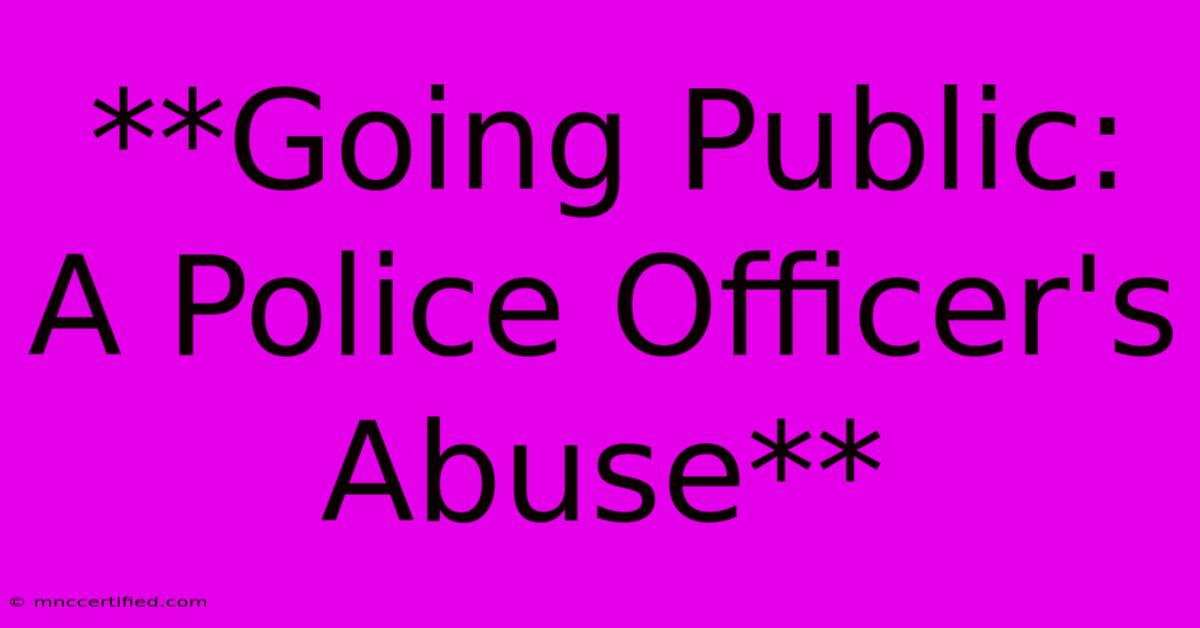**Going Public: A Police Officer's Abuse**

Table of Contents
Going Public: A Police Officer's Abuse
The blue line is often seen as a symbol of safety and security, but for many, it represents a system that has failed them. One of the most harrowing realities is police abuse, a deeply rooted issue that often goes unreported and unpunished. This article delves into the courageous act of going public with a police officer's abuse, examining the complexities, challenges, and the potential impact it can have.
The Trauma of Police Abuse
Police abuse can take many forms, including:
- Physical assault: This can range from excessive force during arrests to unjustified beatings.
- Verbal harassment: Insults, threats, and intimidation can be deeply traumatizing.
- False arrests: Fabricated charges and wrongful detention are serious violations of rights.
- Racial profiling: Targeting individuals based on race or ethnicity is a pervasive form of abuse.
- Sexual misconduct: This includes unwanted advances, groping, and sexual assault.
The emotional and psychological impact of police abuse can be profound. Victims often experience:
- Post-traumatic stress disorder (PTSD): Flashbacks, nightmares, and anxiety can be debilitating.
- Depression and anxiety: The fear of future encounters with law enforcement can lead to chronic stress.
- Loss of trust in authority: Police abuse erodes faith in the justice system.
- Social isolation: Fear of retaliation or disbelief from others can lead to isolation.
Why Going Public is Crucial
Sharing your story of police abuse can be a difficult decision, but it's crucial for several reasons:
- Holding abusers accountable: Reporting abuse exposes the officer's actions and increases the likelihood of consequences.
- Preventing future abuse: Publicly documented cases can deter future abuse by the officer or others.
- Providing support for other victims: Sharing your story can empower others to come forward.
- Promoting systemic change: Bringing awareness to the issue of police abuse can contribute to reforms and policy changes.
The Challenges of Going Public
Deciding to go public with a police abuse story can be a complex and difficult choice. It's essential to consider the potential challenges:
- Fear of retaliation: Victims may fear being targeted by the abuser or other law enforcement officers.
- Lack of support: Some individuals may not believe the victim's story or offer support.
- Stigma and shame: Society often blames victims of police abuse, creating a culture of silence.
- Legal complexities: Civil suits against police officers can be expensive and time-consuming.
Seeking Support and Resources
If you're considering going public with a police abuse story, it's vital to seek support and resources:
- Legal aid organizations: These organizations can provide legal advice and representation.
- Victim advocacy groups: These groups offer emotional support, counseling, and guidance.
- Community organizations: Reach out to local organizations that work on issues of police accountability.
- Journalists and media outlets: Consider contacting journalists who have experience covering police abuse.
The Power of Public Accountability
While going public can be daunting, it's crucial for holding abusers accountable and creating a more just society. The courage of victims who share their stories can spark change and create a safer future for all.
Keywords: police abuse, police brutality, going public, victim support, legal aid, accountability, systemic change, justice, human rights, fear of retaliation, PTSD, depression, anxiety, racial profiling, sexual misconduct, false arrest.
This article provides a starting point for a comprehensive discussion on going public with police abuse. It's essential to continue researching and seeking diverse perspectives on this complex issue.

Thank you for visiting our website wich cover about **Going Public: A Police Officer's Abuse**. We hope the information provided has been useful to you. Feel free to contact us if you have any questions or need further assistance. See you next time and dont miss to bookmark.
Featured Posts
-
Referee Addresses Penalty Controversy Inter Napoli
Nov 12, 2024
-
Johan Testa Barncoop Investments Inc
Nov 12, 2024
-
Cks Prime Investments Debt Collector
Nov 12, 2024
-
Wall Street Rises Bitcoin Surges Today
Nov 12, 2024
-
Early Times Whiskey Bottled In Bond
Nov 12, 2024